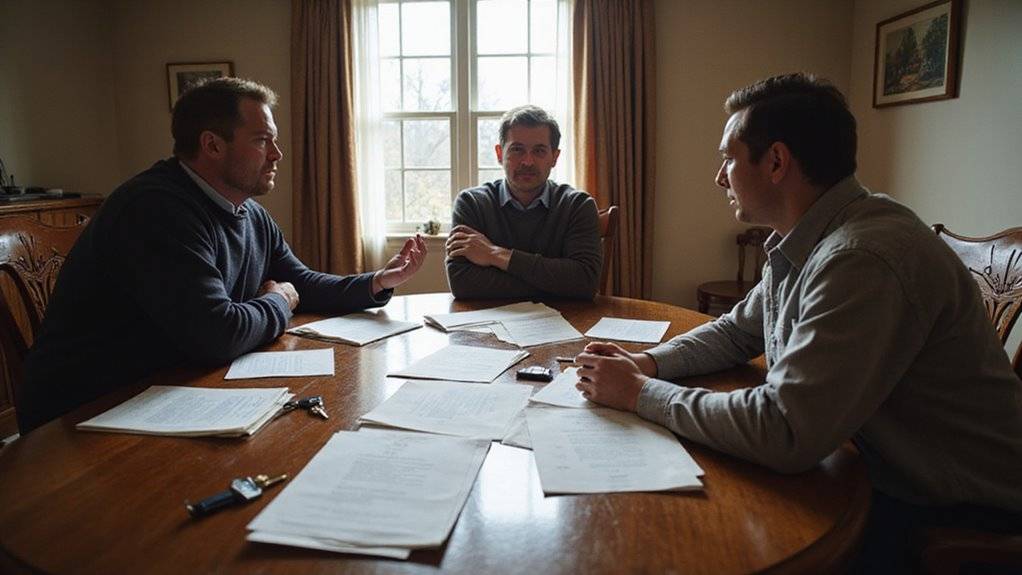Navigating property sales between multiple heirs often creates a perfect storm of family conflict and legal complexity. Heirs frequently clash over timing, pricing, and whether to sell at all, leading to stalled decisions and strained relationships. Fortunately, legal pathways exist to move forward even without complete agreement among all parties.
While unanimous consent simplifies the process, Virginia law doesn’t require all heirs to agree on selling inherited property. Under Virginia Code § 8.01-81, any heir can initiate a partition action through courts to force a sale. Additionally, individual heirs retain the right to sell their ownership share independently.
This guide explores legal options, required documentation, and strategies for selling inherited property with multiple heirs.
Key Takeaways
- All heirs do not need to agree to sell inherited property; individual heirs can pursue legal partition actions.
- Any heir can file a partition action under Virginia Code § 8.01-81 to force property division or sale.
- Individual heirs can sell their ownership share independently without permission from other co-owners.
- Major property decisions require agreement from all parties unless a court orders otherwise through partition proceedings.
- Courts can order property sales without unanimous consent to protect all heirs’ rights and interests.
Do All Heirs Have to Agree to Sell Inherited Property?

No, all heirs do not need to agree to sell inherited property. The law provides options when heirs disagree about selling.
Most states allow inherited property to be divided through legal partition actions if heirs cannot reach agreement. A court can order the sale of property even without unanimous consent. Individual heirs can also sell their ownership share to willing buyers or other heirs.
The law recognizes that forcing heirs to remain co-owners indefinitely is impractical. In light of this fact, courts generally favor solutions that let willing sellers liquidate their interests while protecting all parties’ rights.
What Happens When Multiple Heirs Inherit a Property?
When you and other heirs inherit property together, you’ll typically own it as tenants in common, meaning each person holds a distinct percentage share while sharing access to the entire property. This arrangement gives each heir specific legal rights—including the ability to sell or transfer their individual interest—but it also creates significant friction points. You’ll need to understand how ownership type, individual rights, and common disputes interact before you can navigate whether unanimous agreement is required for a sale.
Types of Property Ownership Among Heirs
Property ownership among heirs takes three main forms. Tenants in Common allows heirs to hold unequal property shares and transfer their portions independently. Joint Tenancy requires equal shares among all heirs, with automatic rights passing to survivors. Tenancy by Entirety applies exclusively to married couples who must make decisions together.
As a practical matter, heirs retain full property access rights. No single heir can prevent others from using the inherited property. Furthermore, major property decisions require agreement from all involved parties under each ownership type.
Legal Rights of Each Heir
Legal heirs possess specific rights to inherited property. Each heir can use the property and receive rental income based on their ownership share. Heirs maintain the freedom to sell or transfer their individual interests without permission from others.
Virginia Code § 8.01-81 allows heirs to request a partition action through the courts. This legal process helps resolve disputes when heirs cannot agree on property distribution. A court can order either a property sale or physical division.
Heirs can negotiate buyout agreements with co-owners. This option lets interested heirs purchase others’ shares at fair market value.
Common Conflicts Between Heirs
Property inheritance sparks five major conflicts between heirs. Most heirs clash over whether to sell or keep inherited real estate assets. Money needs drive some siblings to push for quick sales. Others resist selling due to emotional attachments or investment potential.
Clear communication helps prevent additional disputes. Heirs must jointly decide how to split maintenance costs, taxes, and rental income. These financial responsibilities often strain family relationships. At the same time, differing opinions about property values and management decisions create tension.
Can One Heir Force the Sale of Inherited Property?
Yes, an heir can legally force the sale of inherited property through court action. A single heir has the right to file a partition action in court to divide or sell inherited property. The court will first determine if the property can be physically divided among heirs. When physical division proves impractical, the judge will order a sale.
Courts prefer voluntary agreements between heirs through mediation. This approach saves money and maintains family harmony. After a court-ordered sale, each heir receives their share based on their ownership percentage. Professional mediation services help heirs reach fair agreements without legal battles.
What Legal Options Exist When Heirs Disagree?

When heirs can’t agree on selling inherited property, Virginia law provides several structured pathways to resolve the deadlock. You can pursue a partition action under Virginia Code § 8.01-81 to force a sale, negotiate a buyout where some heirs purchase others’ shares, or engage in mediation to reach a voluntary settlement. If these approaches fail, courts will intervene and order either a physical division of the property or a sale with proceeds distributed according to each heir’s ownership interest.
Partition Actions Explained
Partition actions allow heirs to legally force the sale of inherited property when co-owners cannot agree. Virginia Code § 8.01-81 establishes the right to petition courts for property division or sale. A court reviews the petition and determines whether physical division makes sense.
The process requires four main steps: filing a petition, property evaluation, receiving a court order, and distributing sale proceeds. This legal solution prevents deadlock situations between heirs.
Most homes cannot be physically divided. Therefore, courts usually order a sale and split the money based on ownership percentages. As a result, all heirs receive their fair share of the inheritance value.
Buyout Agreements
A buyout agreement lets co-owners purchase shares from other owners who want to sell. Each heir’s share value comes from a professional market appraisal of the total property. The process works best with a neutral mediator to guide discussions. A formal written contract protects all parties’ interests.
Moreover, buyers can pay through single payments or planned installments. Legal ownership transfers require updated property deeds and proper documentation. This peaceful solution maintains family harmony while respecting individual choices.
Mediation and Arbitration
Mediation and arbitration provide alternatives to lengthy court battles. These methods help resolve disputes through neutral third parties.
A professional mediator can settle conflicts at 50-70% lower cost than traditional litigation. Mediators guide productive conversations while arbitrators make binding decisions. Both options offer faster resolutions than courts.
Each party maintains control over final agreements in mediation. The process preserves important relationships through structured dialogue. Moreover, arbitration delivers quicker outcomes with legally binding results.
Court-Ordered Sales
Virginia courts can force the sale of inherited property through partition actions under Code § 8.01-81. A single co-owner has the right to request a court-ordered property sale. The court first explores options to divide the property physically among heirs.
In most cases involving houses, physical division proves impossible. The court then orders a sale with proceeds split by ownership percentages. This legal process offers a clear solution when heirs disagree. Moreover, the system protects individual rights while ensuring fair resolution for all parties involved.
How to Sell Inherited Property When All Heirs Agree?
When all heirs agree to sell, you’ll need to secure proper legal documentation like letters testamentary or an order of qualification from probate court. Next, you must clear the title of any liens or clouds and obtain a professional appraisal to establish fair market value based on the property’s stepped-up basis at death. Finally, you’ll distribute the sale proceeds according to each heir’s ownership share as defined by the will or intestacy laws.
Obtaining Proper Legal Documentation
Legal Documentation Required for Inherited Property Sales Four essential documents prove your right to sell inherited property in Virginia. A letters testamentary or administration document confirms your role as estate representative. The property owner’s death certificate verifies their passing. A clear deed establishes the ownership chain.
All heirs must provide signed authorization for the sale to proceed. Your attorney submits these vital papers to the circuit court clerk. This documentation protects both seller and buyer interests throughout the transfer process. A complete file helps prevent future ownership disputes.
Clearing the Title
Title clearance confirms there are no legal claims against an inherited Virginia property. A title company reviews property records to verify ownership rights. Property liens, judgments, and tax obligations must be resolved before any sale can proceed. The search protects both sellers and buyers from future legal issues.
Legal documents from probate court prove transfer authority. The title company verifies each heir’s right to sell. A clear title prevents ownership disputes and allows the sale to move forward. This process safeguards everyone’s interests.
Determining Fair Market Value
Fair market value represents the price a property would sell for between a willing buyer and seller in the current market.
A professional appraiser can determine an accurate value through detailed analysis. Local market data shows recent sales of similar properties within a one-mile radius over six months. The condition of the property affects its worth, so repairs and upgrades must factor into calculations.
Real estate agents provide valuable market expertise and pricing insights. Multiple opinions from qualified professionals help establish a reliable fair market value range of +/- 5%. These expert assessments protect everyone’s financial interests.
Distributing Proceeds Among Heirs
Each heir receives proceeds based on their legal ownership percentage of the property. Virginia law requires distribution according to the will or state intestacy rules for inheritance shares. The closing attorney handles fund disbursement directly to heirs.
Heirs must provide letters testamentary or court orders to validate their legal right to inherit. A stepped-up basis determines capital gains tax obligations on the sale. To maintain harmony, all heirs should agree to sale terms in writing.
Clear records and proper documentation protect everyone’s interests in the transaction. Proactive communication prevents misunderstandings about share amounts and payment timing.
What Are the Tax Implications of Selling Inherited Property?

When you sell inherited property in Virginia, you’ll face tax consequences that depend on your gain, the estate’s value, and available exemptions. Your capital gains tax is calculated using the property’s stepped-up fair market value at the date of death, not what the deceased originally paid. You’ll need to understand estate tax thresholds, capital gains calculations, and significant deductions that can reduce your tax burden.
Capital Gains Considerations
A stepped-up basis reduces your tax burden when selling inherited Virginia property. The IRS calculates capital gains using the property’s fair market value on the death date, not the original purchase price. This method protects heirs from paying taxes on years of accumulated value.
Key steps protect your financial interests. A professional appraisal establishes the property’s precise value at inheritance. Keep records of any improvements made before selling. Moreover, inherited assets automatically qualify for long-term capital gains rates.
Your tax applies only to value increases between the stepped-up basis and final sale price. This favorable treatment makes inherited property transfers more financially manageable.
Estate Tax Issues
Estate tax rarely affects Virginia property sales after inheritance. Federal estate taxes apply only to estates worth over $13.61 million in 2024. Virginia has no state estate tax since 2007. Most families can proceed with inherited property sales without tax burdens.
Legal documents remain essential for any property transfer. A letter testamentary or qualification order proves your right to sell. An estate attorney can guide you through complex situations.
The IRS requires proper documentation of inheritance distributions. Your attorney will ensure fair allocation of proceeds among all heirs. Clear ownership records prevent future disputes about asset distribution.
Tax Exemptions and Deductions
Tax exemptions and deductions reduce your overall tax burden during estate transfers. Common estate deductions include estate taxes, funeral expenses, and outstanding debts. The federal estate tax exemption allows up to $12.92 million in 2023 without taxation. Property owners can deduct maintenance costs and legal fees during settlement.
Professional fees for accountants, attorneys, and appraisers qualify as legitimate deductions. Furthermore, state-specific exemptions may offer additional tax relief opportunities. Many states allow deductions for medical expenses paid within one year before death. Money spent on estate preservation and necessary repairs remains tax-deductible throughout the process.
How Can Heirs Resolve Disputes Over Property Sales?

You can resolve disputes over inherited property through structured communication, professional legal guidance, and negotiated compromises. Start by opening honest discussions about each heir’s financial needs and emotional attachments to the property, then engage an estate attorney to clarify your legal rights and options. If direct negotiation stalls, consider mediation to reach a fair settlement—whether that’s a buyout, delayed sale, or partition action.
Effective Communication Strategies
Effective communication requires clear messages, active listening, and respectful dialogue. Start with face-to-face conversations to build trust and understanding. A neutral third party can facilitate difficult discussions between team members. Each participant should receive equal time to share concerns and ideas.
Next, document key points in writing to prevent confusion. Send follow-up emails after meetings to confirm decisions and next steps. Teams that maintain written records reduce misunderstandings by 65%.
Strong communicators focus on solutions rather than blame. They ask questions, validate feelings, and propose constructive options. Regular check-ins help monitor progress and address issues early.
Working With Estate Attorneys
Estate attorneys help solve inheritance disputes and protect your legal rights during property distribution. A qualified estate lawyer will examine wills, titles, and state inheritance laws under Virginia Code § 8.01-81. These professionals negotiate fair agreements between heirs to avoid costly court battles. Your attorney creates clear documentation for property transfers and ownership changes.
Moreover, estate lawyers handle tax questions and manage communication with executors. Their expertise prevents costly mistakes in complex probate cases. Professional guidance keeps family relationships intact during difficult estate decisions.
Creating a Fair Compromise
Fair compromises emerge through open communication and structured solutions. Put all positions and requests in writing to establish clear expectations. A neutral mediator can guide productive discussions between parties. Legal mediation helps resolve 85% of inheritance disputes without court intervention.
Several proven approaches exist. Heirs can arrange buyouts at fair market value to consolidate ownership. Phased timelines allow flexibility for different needs. Written agreements keep everyone accountable.
Simple steps lead to lasting results. Focus on shared family goals rather than individual demands. Professional guidance ensures fair treatment for all parties involved.
Conclusion
Property inheritance disputes can be resolved through legal channels even when heirs disagree about selling. Multiple options exist for Virginia property owners facing conflicts with co-inheritors. Courts can enforce partition actions when necessary, while mediation offers a more amicable solution.
At Align Real Estate Solutions, we understand the complexities of inherited property situations throughout Virginia cities. We regularly work with property owners who need to sell despite family disagreements. Our team can guide you through various solutions, including fair market buyouts and quick closing options.
We offer straightforward purchases for inherited properties in Richmond, Norfolk, Virginia Beach, and surrounding areas. Our process helps heirs avoid lengthy court battles and mounting maintenance costs. If you’re struggling with co-owner disputes, we can provide a hassle-free selling option that works for all parties.
Author
-

Zach Koops is co-founder and Real Estate Success Manager at Align Real Estate Solutions, serving homeowners across Virginia since 2024. With a passion for real estate and a heart for people, Zach has built his career around helping sellers navigate tough situations—foreclosure, inheritance, relocation, repair-overload—with clarity and compassion. He’s known for being straightforward, steady under pressure, and deeply invested in relationships. Outside of work, he spends his time as a husband and father, enjoys the outdoors in Shenandoah Valley, loves singing on stage, and constantly seeks growth through reading and new experiences.










